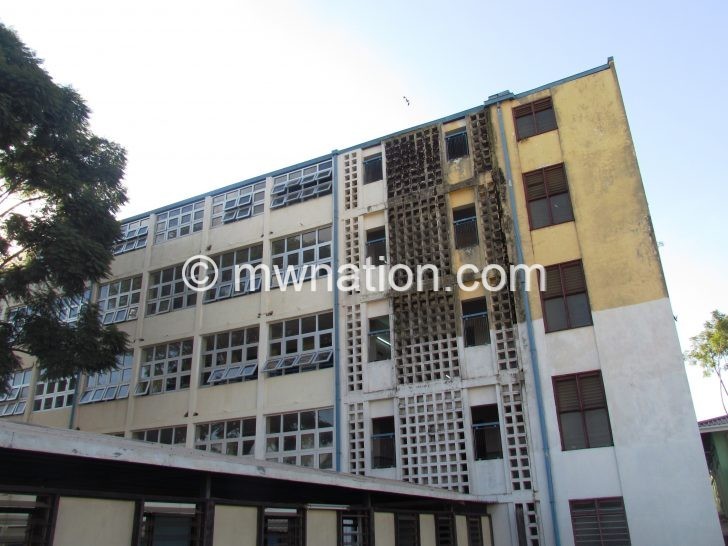Funding woes hit KCH hard
The slimming disease of low funding that continues to hit the health sector has forced KCH to limit the number of ICU admissions due to shortage of staff while its psychiatric section has also been closed as it scales down on operations.
Kamuzu Central Hospital (KCH) has since written the Ministry of Health to consider providing extra 150 nurses to serve the dire situation, according to a Nursing Quarterly Report Nation on Sunday has seen, but the Ministry of Health has said it is aware of the challenges KCH faces.

In an interview, hospital director Dr Jonathan Ngoma said KCH is facing critical shortage of staff and is operating on a shoe-string budget.
He said they scaled down on operations in the intensive care unit (ICU) to five admissions due to shortage of nurses.
“In an ideal situation, a hospital this big should have up to 20 functional beds in an ICU, with 30 nurses or so on duty, but we can only manage 10, which is an expansion from four beds previously. Unfortunately, we can only use five beds because of number of staff [nurses]. In an ideal situation, the ICU requires two nurses per patient, but in our case it’s one-to-one,” said Ngoma.
Currently, KCH which caters for the entire Central Region, and part of the North on specialised cases, has a capacity of 800 beds, yet on average admits about 1 200 patients against a nurse population of about 341, according to Ngoma.
Asked on what happens when they have more than five cases that require ICU services at the hospital, a doctor who spoke on condition of anonymity said: “We allow nature to take its course. There is not much we can do and this is the most painful part of our job—to see people dying when we could have saved them.”
Ngoma said he is equally concerned with the state of affairs, saying the limited funding has made their life difficult such that the facility records needless deaths. He could, however, not provide the number of ‘needless’ deaths, saying they do not keep such a record.
The hospital director said as part of austerity measures, KCH has just closed the Psychiatric Unit, which was housed at Bwaila Hospital—with 50 patients split between Zomba Mental Hospital and St. John of God hospital in Area 43 under a service level agreement.
In the current financial year, KCH was allocated about K800 million, with a monthly budget of about K69 million against a required K200 million.
“How do we run the hospital with such a small amount? This is a big referral hospital catering for millions of people. It deserves better in terms of funding. Our allocation in the last two years has remained static despite the rising cost of living,” said the KCH director.
Nation on Sunday’s visit to the hospital this week found some patients sleeping on the floor and in corridors while the male surgical ward had between 78 and 80 patients against four nurses for the eight–hour day shift and two nurses for the 16-hour night shift.
National Organisation of Nurses and Midwives of Malawi (Nonm) president Dorothy Ngoma described the situation as unacceptable.
“The surgical ward deals with fragile and serious cases requiring quality care. These could be cases from accidents with all sorts of injuries. Therefore, having one nurse looking after over 20 patients is totally unacceptable. Unfortunately, this is what our government has decided to do,” said the Nonm president, adding that in extreme cases, the nurse should look after 10 patients in a surgical ward.
She said the locum facility, which uses off-duty nurses to provide services at a fee, is not a lasting solution as it overwhelms nurses who sometimes abandon work for money.
Parliamentary Committee on Health chairperson Juliana Lunguzi said she was not surprised with the sad development at KCH.
“People die every day in our hospitals—from Nsanje to Chitipa—because of government negligence. The whole issue of having five beds in an ICU speaks volume of how careless we are as a nation. It is poor people who suffer the most because they have no alternatives,” Lunguzi said, stressing the need to increase funding towards the health sector.
But Lunguzi said she was against a service-level agreement on the psychiatry unit with St. John of God, arguing that government should have invested the money in a better facility to cater for mental patients.
Malawi Health Equity Network executive director George Jobe said the KCH scenario is a reflection of funding problems most hospitals are facing.
He urged government to respect its commitment to providing 15 percent of the total national budget to health in line with the Abuja Declaration.
“There is a reason they set 15 percent. It was meant to avoid problems we are facing now. In the current budget, health has been given 10 percent of the total budget. This is the more reason we are having all these challenges. ICU is a critical section and the issue must be treated as a disaster,” Jobe said.
Principal Secretary for Health Dan Namarika said the Ministry is equally concerned with challenges KCH is facing.
“The ministry is operating with 50 percent vacancy rate and cannot recruit more because of the wage bill. However, some donors are willing to help, like USaid will help the Ministry recruit 500 more staff by November this year. Global Fund has provided a grant which will help to recruit up to 2 000 workers,” said Namarika.
He, however, said the closure of the psychiatric unit was based on poor sanitation, because the facility was inhabitable.
In April this year, Nation on Sunday also reported the deplorable conditions at the unit in Bwaila and how it had become become filthy for patients.
“So, in the meantime, Bwaila Hospital will be providing out-patient services and there is a psychiatrist available for this. In special cases, admissions of up to five patients would be allowed for a period 24 to 48 hours, before referring such cases to St. John of God in Mzuzu or Lilongwe and Zomba Mental Hospital. The plan is to construct a psychiatric Unit at KCH. The closed unit was quiet filthy and had not been rehabilitated since construction in 1900,” Namarika said.
In addition to low staffing levels, KCH, as is the case with many hospitals, also faces shortage of drugs as it only gets 30 to 40 percent of its drug needs.
The hospital director said the drug shortage has forced the facility to ask patients in some instances to buy their own drugs.






How can the hospital be operated on shoes string budget… how can the lives on poor taxpayers be operated on shoes string budget? If the ministry of health is aware why he can’t pump in money? How much did chaponda took from taxpayers? How much did kondwani nankhumwa took from MRA ? How about 2.9billion missing?
I think APM is just asign post… he sees this but not act…. minister for health must be fired together with deputy…Akulu akulu a kamuzu central they are failing to work because of you politicians…UNDER FUNDING PAMENE MUKUBA its this is criminal scandal to the taxpayers